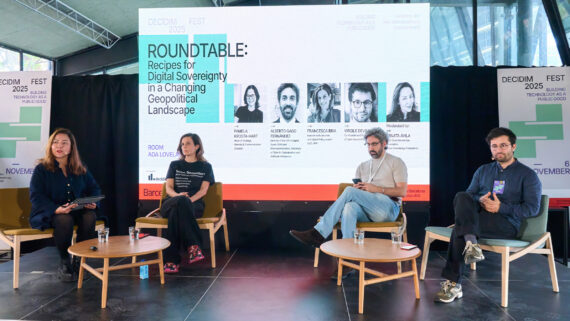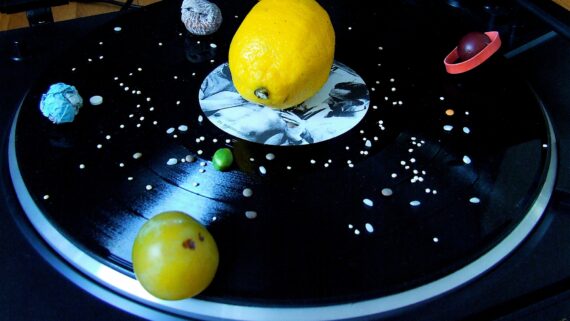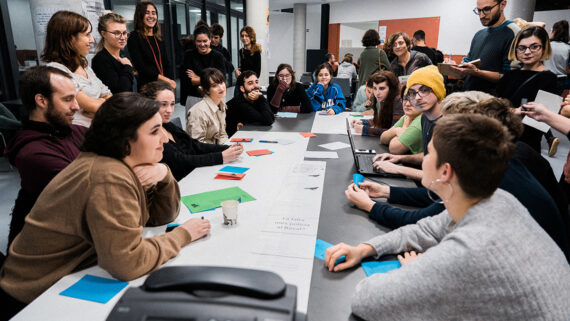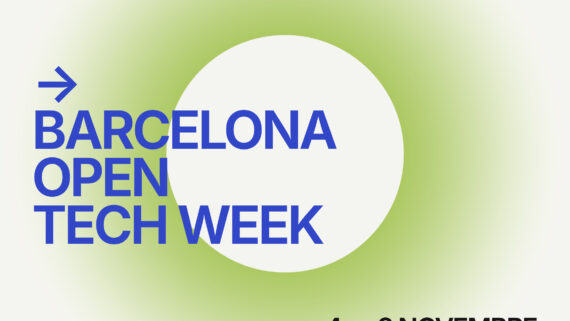On March 1st, the Canòdromo became the epicenter of a unique day where music, technology, and advocacy took center stage. Under the motto “8M: Music and technology in the stands,” attendees were part of an enriching and inspiring experience.
A battle to create music collaboratively with algorithms
The event started with a musical battle, where artificial intelligence took center stage. Through an exciting competition between two teams, the limits of generative AI and musical “prompts” were explored.
We are witnessing an incredible growth in the use of tools that can turn text into content. They are everywhere, from ChatGPT to Dall-E or Midjourney, and anyone can use these models to create original ideas just by explaining in simple words what they want to do.
Prompt battles are like a live contest where competition and collaboration occur using programs that transform text into images or audio. The goal is to foster innovation, creativity, and collaboration in the world of musical technology, advancing in the field of text-to-audio generation.
During the event, detailed explanations led by the prominent expert Roser Batlle Roca, PhD student in musical AI and ethics at the Music Technology Group of the UPF, and sound engineers Giulia Silvestri and M. Stella Tavella, from , along with other figures like Thais Ruiz de Alda from Digital Fems and Anna Inglés, co-coordinator of the Technical Office of Canòdrom, guided attendees in a fascinating text-to-music experience, demonstrating that the power of collaboration between human creativity and technology is possible and limitless.
How artists use artificial intelligence
With the participation of guests such as nara is neus, physicist, musician, soundtrack composer, and avant-garde music producer; Rita Giménez, consultant in public policies and part of the Barcelona Music Tech Hub; Laura Benítez-Valero, PhD in Philosophy from the UAB and university lecturer; Thais Ruiz de Alda, founder and CEO of Digital Fems; and Roser Batlle, PhD student in musical AI and ethics at the Music Technology Group of the UPF, a deep debate was initiated, moderated by Ginebra Vall, coordinator of the Network of Community Radios of Barcelona (XRCB), about the importance of representation of women and non-binary identities in the fields of technology and the music industry, as well as the needs for accountability and inclusive governance.
Thais Ruiz de Alda emphasized that there are only between 10-20% of collaborating women and non-binary individuals in music, stating that “the platformization of the music industry is amplifying gender gaps. Diverse perspectives are needed in tool design.” In this regard, Rita Giménez stressed that it is very important to raise awareness among citizens, institutions, and universities to show that girls can be part of this world. “If we cannot participate more in technology, we will not be able to create it in the future.” Artist nara is neus added hope, stating that “we are witnessing a generational change, for example, lately in algoraves there are many women and queer individuals doing live coding, technology, and music.”
The lack of representation of African and Latin American cultures in technology and the music industry is a topic that deserves deep reflection. To address this situation, Roser Batlle said that “we need to work from an intersectional perspective.” Laura Benítez affirmed that this implies not only including more artists and creators from these cultures in technology and the music industry, but also ensuring that their voices and perspectives are valued and respected. “Furthermore, it is important to promote collaboration and cultural exchange among communities to enrich representation and promote mutual understanding, favoring accountability within technological projects to ensure that the governance that is generated considers our perspectives.”
Experimentation and queer advocacy
Starting at 6:30 PM, artist ALBXROTO created an immersive atmosphere, bringing to the stage a unique combination of electronic sounds, post-punk, creating an innovative sound experience challenging traditional musical conventions.
In addition to his solo career, he is a co-founder of PIXELPOP, an independent queer collective that has made its mark in cities like Barcelona, Madrid, Valencia, and Prague. In this collective, he serves as a promoter, booker, and performer, contributing to diversity and inclusion in the music scene.
The day concluded with a concert by nara is neus, and a reverential silence filled the space, absorbing all the magic that had flooded Canòdrom that day. It was a fleeting yet eternal moment, an indelible memory of the ability of art to elevate and inspire us, of the ability of technology to connect us, and of the ability of women and non-binary artists to change the world.







